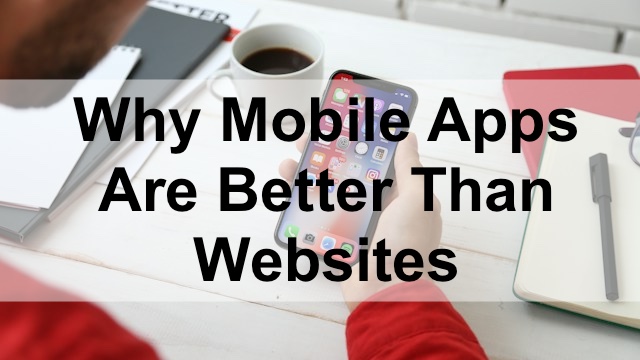Want to know why mobile apps are better than websites? Check out these five reasons!
We have gradually transitioned towards the mobile and smartphone era, as the number of mobile users today is greater than the number of desktop users. This transition has been sensed by businesses worldwide and has started giving apps the importance that they truly deserve.
An ongoing debate between mobile apps and websites is currently a hot topic. While some businesses have employed both apps and websites, some are looking to choose between either one of the two.
Mobile apps are generally a superior choice to mobile websites, as is evident from various studies that show that users prefer apps more than mobile websites and in this article, we have explored several reasons that advocate why mobile apps are a better option than websites.
More on Creating and Using Apps Here:
Better Personalization
Personalization is a buzzword that most users are interested in nowadays. Users want everything to be personalized according to their preferences. Offering personalization to users is way easier on mobile apps than it is on mobile websites.
With mobile apps, users can customize their preferences right from the start so that they have a personalized app experience, such as setting the dark mode on the app.
In addition to this, apps can also track customer engagement and utilize it to offer personalized recommendations to the users. Every user loves personalized content and by providing personalization, there is a higher chance of getting conversion through apps as compared to websites.
Ease to Send Notifications
Mobile apps come with the added feature of being able to send notifications. There was a time when email was used as the most widespread method of delivering messages to users, but due to extensive usage, it has lost its effectiveness.
In the case of mobile apps, you can send app notifications directly to your users. These apps are of two types; push and in-app. Both types of app notifications have proven to be highly effective in communicating with users without annoying them.
With mobile apps, you can instantly send notifications to users whenever you want to, which makes applications a better choice than websites and a key reason why most businesses like Talk to Strangers are advocating for and preferring mobile apps over websites nowadays.
Check These:

https://unsplash.com/photos/space-gray-iphone-x-9e9PD9blAto
Use Mobile Phone’s Features
With a website, you are limited to certain features only, as you don’t get much access to the device’s features, but that is not the case with mobile apps. Mobile apps have the huge advantage of being able to use the features of mobile devices like cameras, GPS, compasses, accelerometers, etc.
Mobile technology has improved so much in the past few years and with cell phones packed with advanced features, applications get the benefit of utilizing those features to make the user experience even better.
Some might argue that mobile websites can also use some of the features of the mobile phone. Yes, that is true, as when you visit a website like Stranger Meetup, it can utilize mobile features like a camera and GPS, but generally, apps are more convenient when it comes to truly utilizing the features of a cell phone.
Offline Usability
The most striking difference between a mobile website and a mobile application is that a mobile app gives users the ability to access the app and use it without the internet.
Although some apps are there that require an active internet connection, most apps offer the basic functionality and usability to users without an internet connection.
For instance, mobile games, tools, and productivity apps can work even without an internet connection, leading to many users preferring an app over a website.
Check These Articles Out:
Apps Work Faster than Websites
A well-designed and properly organized app can work much faster than a website. Since users download mobile applications and these applications store their data locally on mobile devices, they work much faster than websites, which use web servers for this purpose.
Due to this reason, data retrieval happens much more quickly in apps than it happens on websites. Plus mobile apps can save user preferences locally so that any time they open the app, it is customized according to their preferences, unlike websites, where you have to start fresh every time.
